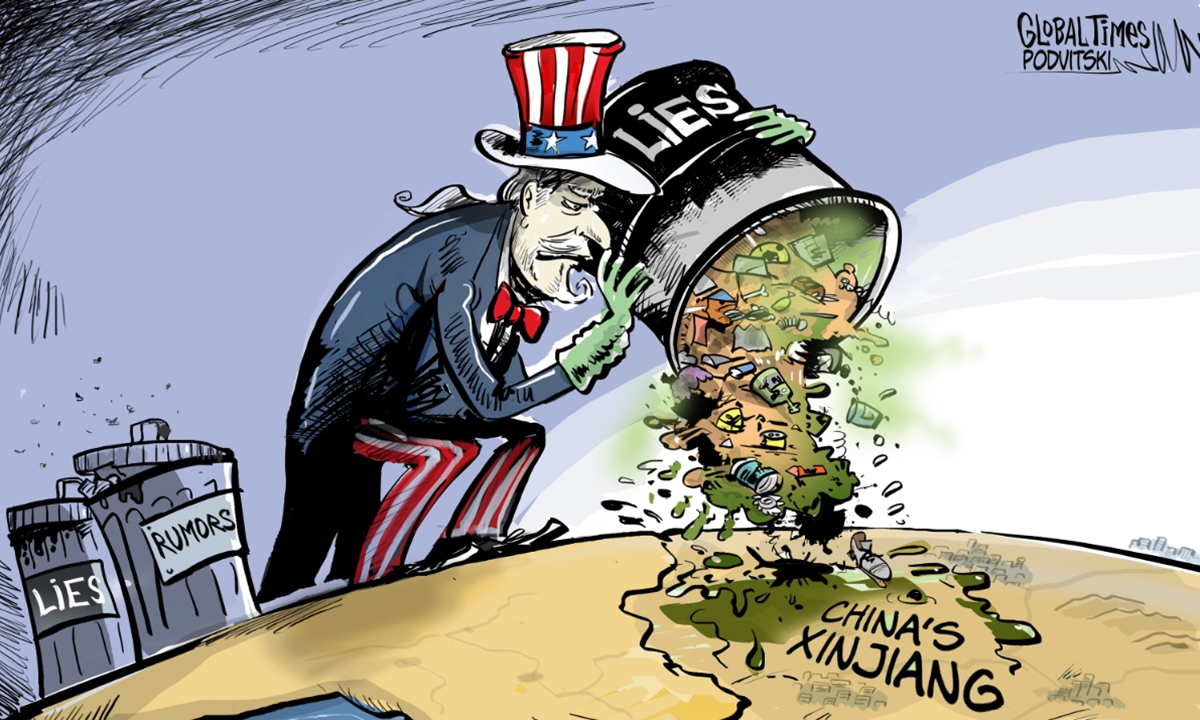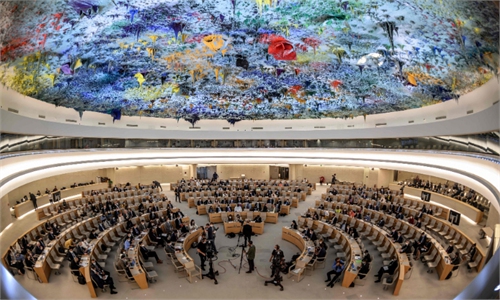Global audiences are fed up with US-led West’s ‘show’ on human rights: Global Times editorial

Slandering Xinjiang -- the new normal of the "empire of lies" Illustration: Vitaly Podvitski
The 51st session of the United Nations Human Rights Council (HRC) on Thursday voted on a US-led Xinjiang-related draft decision. The result shows that the draft was strongly opposed by most members of the HRC, especially developing countries, and was not passed. The US and some other Western countries have already consumed a substantial quantity of resources in advance for propaganda and diplomatic agitation for the draft, hyping the vote as a "duel" with China, and sparing no effort to force other member states to be obedient. But this weaponization of human rights is deeply unpopular.
This is the second time in the council's 16-year history that a draft decision has been rejected. Public opinions worldwide almost unanimously believe this is a "major setback" for Western countries. Some Western public opinion even made another stab - calling the outcome a setback to the "West's moral authority." This undoubtedly upset the sensitive nerves of some organizations and individuals in the US and the West. They argue that the result "makes a mockery of everything the Human Rights Council is supposed to stand for," the Muslim countries which voted down the motion are "shameful," and African countries "yielded." Some even call Ukraine's abstention "betrayal."
The draft was put forward by Western countries including the US, the UK and Canada in a bid to hold a debate on "Xinjiang human rights situation" at its next session in March. Many Western media outlets said in their reports that the draft lowered the tone and "called just for holding a debate," in order to avoid the scenario in which enough other countries reject their proposal.
Yet this exposes the real purpose of this draft: It is by no means to discuss any human rights issue, but to try to indefinitely hype up a "problem" that does not exist, so as to suppress and contain China.
Western media have shown their disappointment toward this result, because they were too "confident" before. They have ignored that the majority members of the HRC are not pawns that can be manipulated at their will. Chen Xu, representative of China's Permanent Mission to the UN Office at Geneva and other international organizations in Switzerland, said during the HRC conference that "China is targeted today. Any other developing country could be targeted tomorrow." This sentence has been widely quoted by the international media, and we believe it is just what the representatives of many countries in the conference have been thinking.
The US and the West have politicized and instrumentalized human rights issues. They have been sitting on judgment seat for a long time, and tried to firmly control the direction of public opinion outside the courtroom. They arbitrarily concoct a crime, and the vast number of developing countries will be forced to prove their innocence, which is very difficult. It must be pointed out that Western countries are not qualified to force other countries to stand such a "trial." Ending this humiliating cycle is one of the biggest motivations for developing countries to understand each other, sympathize with each other and unite in the international arena to resist the evil winds.
The essence of Xinjiang-related issues is about countering terrorism, radicalization and separatism, and it is not at all a "human rights" issue. Even some Western media admit that the US and West's hype of Xinjiang-related affairs is essentially a geopolitical friction with China. It is noteworthy that many countries that cast opposing votes are Muslim-majority societies, such as Indonesia, Pakistan, the United Arab Emirates and Qatar. These countries have a better empathy for the governance of Xinjiang, and they have far more say than a few developed countries in the US and the West.
In fact, at the same time as Washington's manipulation of Xinjiang-related affairs is intensifying, nearly 100 countries, including majority of Muslim countries, have publicly and continuously voiced their support for China's just stance on Xinjiang-related affairs and opposed interference in China's internal affairs through Xinjiang-related affairs on various occasions such as the Human Rights Council and the Third Committee of the UN General Assembly. Aren't these voices of justice more convincing than the hypocritical attitudes of the US and some Western countries?
On March 15, 2006, the UN General Assembly passed Resolution 60/251, replacing the previous Commission on Human Rights with the new Human Rights Council, the original intention of which was to change political confrontation in the field of human rights. However, over the years, the US and some Western countries have abused international multilateral platforms to seek geopolitical self-interest, and human rights have become politicized and even weaponized, which has led to serious challenges to the international human rights cause in the true sense.
This session of the HRC which started on September 12 has been going on for nearly a month. It was supposed to be a good opportunity for countries to sit down and discuss how to cooperate on urgent human rights issues. The so-called draft decision on Xinjiang-related affairs by the US and the West has been foiled, and it has once again shown that the performance of smearing others and playing with presumption of guilt is destined to attract few audiences no matter how hard they try, because the global audiences are fed up with these tricks.

